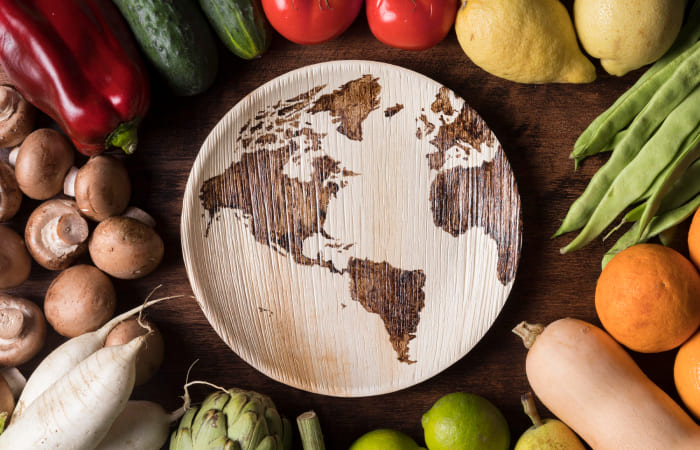
Understanding ISO 13485 (MDQMS): Medical Devices Quality Management System
August 4, 2023In Malaysia’s fast-growing food industry, ensuring food safety is about protecting your customers, building trust, and staying competitive. With increasing consumer awareness and stricter food safety laws, businesses must meet global standards to avoid risks like contamination, product recalls, and loss of market credibility.
One of the most recognised food safety certifications is FSSC 22000 (Food Safety System Certification 22000), based on ISO 22000 and includes additional industry-specific requirements to create a comprehensive food safety management system (FSMS).
This certification helps you manage risks and maintain high-quality standards for food manufacturing, packaging, storage, and distribution.
In this guide, we will explain what FSSC 22000 is, why it’s important for businesses in Malaysia, the key certification steps, and how you can get started.
Key Takeaways
- FSSC 22000 is a globally recognised food safety certification that builds on ISO 22000 with additional requirements for industry-specific risk management.
- Achieving FSSC 22000 certification enhances food safety, regulatory compliance, and business opportunities by meeting global standards.
- The key components of FSSC 22000 include ISO 22000, HACCP principles, industry-specific Prerequisite Programs (PRPs), and additional safety measures like food fraud prevention and traceability.
- FSSC 22000 is essential for food manufacturers, packaging companies, storage and distribution providers, and catering businesses looking to ensure food safety and expand their market reach.
- Getting FSSC 22000 certified involves conducting a gap analysis, implementing a Food Safety Management System (FSMS), training staff, and passing an external audit with ongoing compliance checks.
What Is FSSC?
FSSC 22000 (Food Safety System Certification 22000) is a globally recognised food safety standard based on ISO 22000, with additional industry-specific requirements.
Recognized by the Global Food Safety Initiative (GFSI), it ensures food manufacturing, packaging, storage, and distribution businesses comply with international food safety regulations.
This certification helps companies manage risks, improve food safety, and gain consumer trust, making it essential for businesses aiming for local and global market expansion.
5 Benefits of Having FSSC 22000 for Malaysian Businesses

Ensuring food safety is more than just compliance—it’s about building trust, protecting consumers, and staying competitive in a growing industry. Whether you’re in food manufacturing, packaging, or distribution, obtaining FSSC 22000 certification offers multiple advantages. Here’s why it’s crucial for Malaysian businesses:
1. Ensures Compliance with Global and Local Food Safety Standards
FSSC 22000 is recognized worldwide and aligns with Malaysian food regulations, including those set by the Ministry of Health Malaysia. It helps businesses meet strict international and local food safety laws, reducing the risk of penalties or shutdowns due to non-compliance.
2. Builds Customer and Business Partner Confidence
With increasing consumer awareness of food safety, having FSSC 22000 certification enhances credibility and assures customers that your products meet the highest safety standards. Many multinational brands and retailers also require this certification from their suppliers.
3. Expands Market Opportunities
FSSC 22000 is accepted by major retailers, food manufacturers, and global supply chains. Businesses with this certification gain easier access to international markets, helping them expand beyond Malaysia and attract new customers worldwide.
4. Reduces Risks and Prevents Food Safety Issues
This certification helps businesses identify, control, and eliminate food safety hazards such as contamination, food fraud, and allergen mismanagement. This reduces costly product recalls, foodborne illnesses, and reputational damage.
5. Improves Operational Efficiency and Continuous Improvement
FSSC 22000 requires businesses to establish a structured food safety management system, leading to better quality control, reduced waste, and streamlined processes. It also encourages continuous improvement, helping businesses stay ahead of industry changes and maintain long-term success.
3 Key Components of FSSC 22000 Certification

FSSC 22000 consists of three key components that form a comprehensive food safety management system (FSMS). These components ensure businesses establish strong food safety measures, regulatory compliance, and continuous improvement.
1. How FSSC 22000 is Different from ISO 22000 and HACCP
FSSC 22000 builds upon ISO 22000 and integrates HACCP (Hazard Analysis and Critical Control Points) principles while adding industry-specific requirements. Here’s how they compare:
| Aspect | ISO 22000 | FSSC 22000 | HACCP |
| Scope | General food safety management system. | A globally recognized certification scheme with more structured controls. | A comprehensive certification scheme that combines ISO 22000, HACCP, and additional safety requirements. |
| Recognition | International standard but not GFSI-recognized. | Recognized by the Global Food Safety Initiative (GFSI), accepted by major retailers. | GFSI-recognized, widely accepted by global retailers and food brands. |
| Additional Requirements | Covers food safety risks but lacks sector-specific controls. | Includes food fraud prevention, food defense, and allergen management. | Combines ISO 22000 and HACCP, adding food fraud prevention, food defense, and allergen management. |
| Industry-Specific Approach | Can be applied to any food business but requires additional PRPs. | Incorporates mandatory Prerequisite Programs (PRPs) based on specific industry sectors. | Includes mandatory PRPs based on food industry sectors like manufacturing, packaging, storage, and distribution. |
Want to enhance your food safety standards? Learn more about HACCP certification in Malaysia and how ISO 22000 can help your business meet global food safety requirements.
2. Industry-Specific Prerequisite Programs (PRPs)
PRPs are essential operational conditions that ensure food safety and hygiene throughout the production and supply chain. FSSC 22000 requires businesses to follow sector-specific PRPs tailored to their industry:
a) Food Manufacturing
Covers equipment maintenance, sanitation, and cross-contamination prevention.
b) Food Packaging Production
Ensures safe material handling and hygiene control in packaging environments.
c) Storage & Distribution
Focuses on temperature control, pest management, and traceability.
d) Retail & Catering
Addresses food handling, preparation hygiene, and allergen management.
These industry-specific PRPs provide clear guidelines to prevent food contamination and improve overall food safety compliance.
3. Strengthened Risk Prevention & Compliance Measures
FSSC 22000 adds extra control measures beyond ISO 22000 and PRPs to enhance food safety. These include:
a) Food Fraud Prevention
Detecting and preventing intentional misrepresentation of food products (e.g., mislabeling or ingredient substitution).
b) Food Defense
Protecting food products from intentional contamination or sabotage.
c) Allergen Control
Implementing strict measures to prevent cross-contamination and ensuring accurate labelling.
d) Environmental Monitoring
Conducting regular microbiological testing to control contamination risks.
e) Crisis Management & Traceability
Ensuring quick product recall processes and tracking unsafe products in case of contamination.
Who Needs FSSC 22000 Certification in Malaysia?
FSSC 22000 certification is essential for businesses involved in food production, packaging, storage, and distribution, making it a valuable certification for companies looking to enhance food safety, meet compliance standards, and expand into international markets.
Here are the key industries that benefit from FSSC 22000 certification:
| Industry | Who Needs It | How FSSC 22000 Helps |
| Food Manufacturers | Businesses involved in food production, processing, and handling, such as: 1) Meat, poultry, and seafood processors 2) Dairy and beverage producers 3) Bakeries, confectionery, and snack food manufacturers 4) Frozen and ready-to-eat food production | 1) Ensures safe food production and prevents contamination 2) Meets global retailer and supplier requirements 3) Reduces risk of foodborne illnesses and recalls |
| Food Packaging Companies | Businesses that produce food-safe packaging materials, including: 1) Plastic, paper, and biodegradable food packaging 2) Glass and metal packaging suppliers 3) Flexible and vacuum-sealed packaging manufacturers | 1) Ensures hygiene and material safety compliance 2) Reduces risk of packaging-related contamination 3) Improves traceability and quality control |
| Storage Distribution Companies | Companies involved in food storage, transportation, and logistics, such as: 1) Cold storage and warehouses 2) Food logistics and transportation services 3) Retail and wholesale food distributors. | 1) Prevents contamination during transport 2) Maintains product quality and safety 3) Ensures proper traceability from manufacturer to consumer |
| Catering & Retail Operations | Businesses that handle, prepare, or serve food, including: 1) Hotels, restaurants, and cafes 2) Catering services and cloud kitchens 3) Supermarkets, convenience stores, and hypermarkets | 1) Ensures safe food handling and hygiene compliance 2) Reduces risk of foodborne illnesses 3) Builds customer confidence and trust |
FSSC 22000 Certification Process: Step-by-Step Guide
Obtaining FSSC 22000 certification requires a structured approach to ensure compliance with international food safety standards.
Below is a step-by-step breakdown, along with the required documents needed at each stage.
| Step | Details | Required Documents |
| Step 1: Conduct a Gap Analysis | 1) Evaluate your current food safety practices against FSSC 22000 requirements. 2) Identify gaps and areas that need improvement. 3) Review existing ISO 22000 compliance, PRPs, and HACCP implementation. | 1) Current Food Safety Manual 2) HACCP Plan 3) Prerequisite Programs (PRPs) documentation |
| Step 2: Develop and Implement the Food Safety Management System (FSMS) | 1) Establish documented policies, procedures, and work instructions. 2) Implement HACCP-based hazard control measures. 3) Ensure all employees are trained on food safety standards. 4) Implement sector-specific Prerequisite Programs (PRPs) based on industry requirements. | 1) Food Safety Policy & Objectives 2) Standard Operating Procedures (SOPs) 3) Employee Training Records 4) Food Safety Hazard Control Procedures |
| Step 3: Internal Audit and Management Review | 1) Conduct internal audits to assess readiness. 2) Perform a management review to evaluate food safety policies. 3) Address any non-conformities before the external audit. | 1) Internal Audit Reports 2) Management Review Meeting Minutes 3) Corrective Action Plans |
| Step 4: Certification Audit | 1) Undergo an external audit by an accredited FSSC 22000 certification body. 2) The audit is conducted in two stages: Stage 1: Document review to assess FSMS compliance. Stage 2: On-site audit to verify food safety practices and risk controls. 3) Address any non-conformities found during the audit. | 1) Food Safety Management System (FSMS) Manual 2) Supplier & Raw Material Records 3) Product Recall & Traceability Procedures 4) Audit Non-Conformance Reports |
| Step 5: Continuous Improvement and Surveillance Audits | 1) Maintain compliance through regular updates and monitoring. 2) Undergo annual surveillance audits to retain certification. 3) Continuously improve food safety processes based on audit findings and industry updates. | 1) Surveillance Audit Reports 2) Updated Risk Assessments 3) Continuous Improvement Reports |
Get FSSC 22000 Certified with Confidence Through One Island Consultancy
At One Island Consultancy, we provide expert consultation and hands-on support to help businesses successfully achieve FSSC 22000 certification.
Our services cover the entire certification process, from conducting gap analyses to preparing documentation, training employees, and guiding you through external audits.
| Service | What We Offer | How It Benefits Your Business |
| Step-by-Step Consultation & Implementation Support | 1) Personalised FSSC 22000 roadmaps tailored to your business needs. 2) One-on-one guidance from experienced food safety consultants. 3) Assistance in integrating ISO 22000, HACCP, and PRPs into your operations. | 1) Ensures a smooth and structured certification process. 2) Saves time and reduces errors in compliance. |
| Documentation Preparation & System Implementation | 1) Assistance in developing and reviewing key documents. 2) Customized Food Safety Management System (FSMS) Manual. 3) Preparation of HACCP Plans, PRPs, SOPs, and food safety policies. 4) Setting up traceability, recall, and risk management procedures. | Ensures compliance with FSSC 22000 requirements. Reduces audit non-conformities and delays. |
| Employee Training & Internal Audits | 1) Comprehensive FSSC 22000 training for employees and management. 2) Training on HACCP principles, risk assessment, and food safety controls. 3) Conducting internal audits and mock assessments before the external audit. | 1) Increases staff awareness and readiness for audits. 2) Helps identify and fix compliance gaps early. |
| Certification Audit Support & Post-Certification Maintenance | 1) Assistance during Stage 1 (document review) and Stage 2 (on-site audit). 2) Support in addressing non-conformities and corrective actions. 3) Ongoing surveillance audit preparation and continuous improvement guidance. | 1) Ensures successful audit completion and certification. 2) Helps maintain long-term compliance and food safety excellence. |
Ensure top-tier food safety standards for your business by achieving ISO 22000 certification and HACCP certification in Malaysia with expert guidance and tailored solutions by One Island Consultancy.
Food Packaging Material Company’s Success with FSSC 22000 Certification
QWERTY Industries Sdn Bhd is a leading food packaging material company and recognizes the importance of FSSC 22000 V6 certification, implementing FSSC 22000 not only to ensure compliance with international food safety standards but also to elevate the company’s operations through improved internal processes, employee engagement, and alignment with international best practices.
This strategic move will enhance QWERTY Industries’ reputation in the food packaging sector, offering a significant competitive edge while meeting the stringent safety requirements of its clients and stakeholders.
Challenge
Despite its reputation, QWERTY Industries Sdn Bhd faced challenges in ensuring all production lines and processes meet FSSC 22000 V6 requirements consistently due to risk assessment complexity, knowledge gaps, extensive documentation and managing contamination risks.
Solution
To address this challenge, QWERTY Industries Sdn Bhd adopted FSSC 22000 Version 6. The process included:
- Gap Analysis
• Conducted a comprehensive gap analysis to assess the current food safety management system (FSMS) against the FSSC 22000 V6 standard. - FSMS Design & Implementation
• Developed, implemented and enhanced HACCP (Hazard Analysis Critical Control Point) system, Prerequisite Programs (PRPs) and additional requirements of FSSC 22000 V6
• Developed a robust document control system to manage food safety policies, procedures, work instructions, and records - Employee Engagement
• Ongoing training and awareness programs to employees at all levels - Performance Evaluation
• Conducted regular internal audits to assess the effectiveness of the FSMS
• Periodic management reviews to evaluate the performance of the FSMS.
Outcome
After 12 months of rigorous implementation, QWERTY Industries Sdn Bhd achieved FSSC 22000 Version 6 certification. This milestone delivered the following benefits:
- Enhanced Food Safety Standards: By aligning with FSSC 22000, QWERTY Industries ensures that its packaging materials meet the highest food safety standards, which is critical for maintaining customer trust and brand reputation.
- Operational Efficiency: Streamlining internal processes through standardization, training, and monitoring leads to improved operational efficiency and reduced risks of errors or contamination.
- Global Recognition: Certification to FSSC 22000 provides QWERTY Industries with global recognition as a trusted provider of food-safe packaging, expanding access to international markets and meeting the growing demands for food safety.
- Competitive Edge: FSSC 22000 certification enhances QWERTY Industries’ competitive positioning in the marketplace, showcasing its commitment to quality, safety, and continuous improvement, giving it an advantage over competitors who do not have certification.
Conclusion
FSSC 22000 certification is a strategic investment in food safety, quality, and business growth that helps your business enhance customer trust, global market access, and operational efficiency.
With One Island Consultancy’s expert guidance, businesses can navigate the certification process smoothly, from gap analysis and documentation to staff training and audit preparation.
By obtaining FSSC 22000, you can:
- Ensure compliance with international food safety standards.
- Secure contracts with major food brands and retailers.
- Strengthen risk management and prevent food safety issues.
- Improve operational efficiency with structured food safety protocols.
Take the next step in food safety excellence! Contact One Island Consultancy, your trusted ISO consultant in Malaysia, to start your journey toward FSSC 22000 certification and build a safer, more competitive business.





